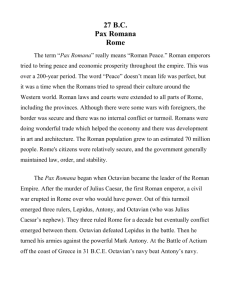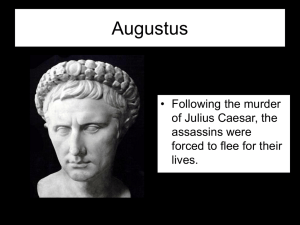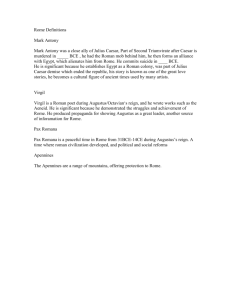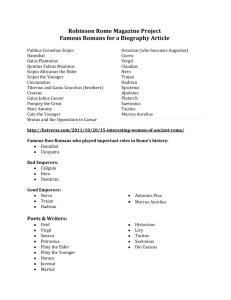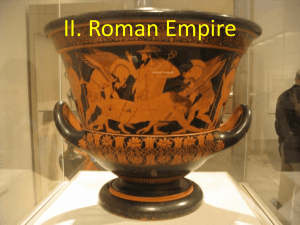Republic to Empire
advertisement
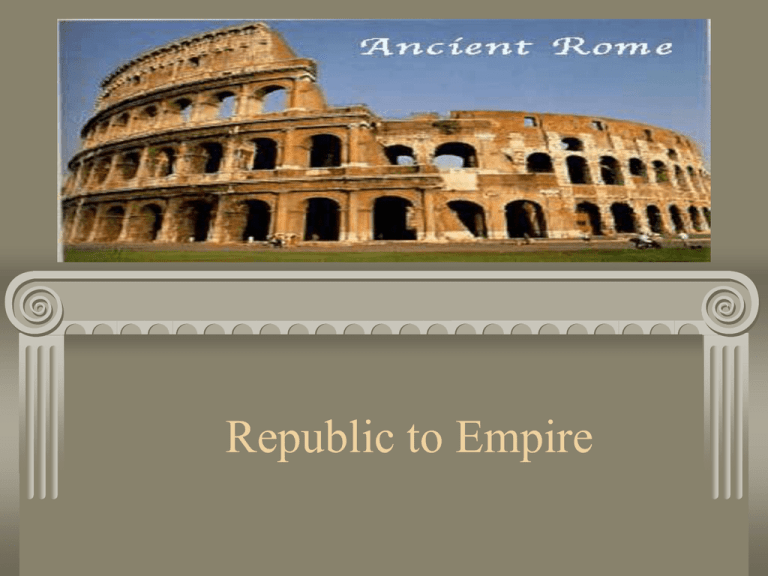
Republic to Empire In the Beginning Romulus and Remus, twin baby boys Thrown into the Tiber River by an evil uncle Helped by a she-wolf Raised by a shepherd Built a city where shepherd found them Romulus built a city wall, Remus mocked him saying it was too small Romulus killed him in anger – named the city Rome after himself Geography Peninsula of Italy located in the central Mediterranean Sea. Apennine Mountains run like a backbone Fertile plains along coasts and in the north. Why is Italy easier to unify than Greece? From humble beginnings, Rome grew into a strong commercial center, in part because of its geographic location Rome enjoyed easy access to the Mediterranean via the Tiber River, but because it was not on the coast, it was safe from invasion or attack by the sea By the 6th Century B.C., trade routes from all parts of Italy converged in Rome Romans Romans Latins Greeks Etruscans Settled in the Tiber River Valley Settled in the Southern portion of Italy and in Sicily Settled in Central Italy Define Republic: Roman Government Republic form of government in which power rests with citizens who have the right to vote In Rome only free-born male adult citizens could vote. Patricians- aristocratic landowners Plebeians- common farmers, artists and merchants Goal was to prevent any individual from gaining too much power. What is this political term for this? Checks and Balances Roman Government Twelve Tables forced by the plebeians so that interpretation of laws were limited Three “groups”: Senate- 300 members Consuls- rulers of Rome Dictator- only in time of war Senate Most powerful governing body. 300 members (patrician class). Served for life. Jobs: Issued decrees, interpreted laws, and elected consuls to rule. Consuls Two consuls Serve only 1-year terms. Could “veto” acts of the other consul. Veto means literally “I forbid” Jobs: Supervised the business of government. Commanded armies Dictator Chosen to rule absolutely in time of war. Complete rule over country when in power. Family and Religion Family center of religion, morals and education. Most important unit in Roman society. “Family” – included unmarried children, married sons and families, all dependent relatives and family slaves. Father was known as “paterfamililias” Religion Adopted and identified with the gods of Greeks. Lares – ancestral spirits within the home. Vesta – guardian of fire and the hearth of which family worship was focused.. Questions: 1. What are the most notable geographic features of Italy? 2. How safe do you think Italy is from invasions? 3. How might Italy’s geographic position have contributed to its ability to expand into the Mediterranean? Roman Expansion and Wars Roman Army Video Info on army: Efficient and well-disciplined. Roman legion - 5,000 men Loyal, courageous Mixture of praise and punishment: Unit that fled a battle faced decimation (1 in 10 put to death) Conquering Lands and People Profess loyalty to Rome. Pay taxes and supply soldiers. Some chose citizenship. Soldiers occupied and posted in foreign lands. Built roads to link provinces. Locals began to adopt Roman language, customs and beliefs. Punic Wars First Punic War Rome versus Carthage Result of a trade rivalry. Lasted 23 years Rome victory gained: Sicily, Corsica and Sardinia. Second Punic War Revenge by Carthage Carthaginians were led by Hannibal He had 50,000 infantry/ 9,000 cavalry/ 60 elephants Scipio defeats Hannibal at Zama and Carthage Punic Wars Third Punic War Devastation of Carthage 50,000 sold in slavery Collapse of the Republic Why did the Roman Republic decline? Widening gap between rich and poor Farmer-soldiers – dead livestock Business/Landowners – Corruption of the wealthy – Slaves made up about 1/3 of population Slave life: Revolts led by Spartacus (73 B.C.) – dies in battle. 6,000 slave followers executed by crucifixion. Collapse of the Republic Tiberius and Gaius Gracchus (GRAK-uhs) Twin brothers They tried to help the poor Strongly opposed Died violent deaths Civil War ensued after their deaths Violence became primary tool in Roman politics. Julius Caesar Formed a triumvirate (“rule of three) with Crassus and Pompey (military generals) He ruled as consul for one year, then became governor of Gaul During his rule of Gaul he won many battles that won him popularity back in Rome Julius Caesar Crassus dies in battle Pompey had become his rival, he asked the senate to order Caesar to disband his army and return home. Crossing of the Rubicon (Jan 10 49 BC) Caesar defied orders by marching across the Rubicon Julius Caesar By 44 BC Caesar become dictator for life Expanded the senate – 900 members. Reduced their power to advisory council. Created jobs. 365 ¼ day calendar. Ides of March March 15 44 B.C. Stabbed 23 times Led by Gaius Cassius and Marcus Brutus Famous last words “Et tu, Brute?” Caesar, Mark Antony, Cleopatra Pompey fled to Egypt Caesar followed him there. Arrived to find him beheaded While in Egypt Caesar met Cleopatra, he helped her to defeat her enemies They fell in love, Cleopatra had a boy named Caesarion. Caesar, Mark Antony, Cleopatra Cleopatra returned home after Caesar’s death Later she would meet Mark Antony in Egypt Mark Antony fell in love with Cleopatra. They will produce twins together. Second Triumvirate Second Triumvirate: Octavian, Mark Antony and Lepidus. Octavian, Mark Antony, Cleopatra Octavian-Grand-nephew of Ceasar was in charge of Rome Mark Antony wanted to be sole ruler of Rome He married and put Cleopatra in power, which angered Octavian Antony was already married to Octavian’s sister Octavian and Mark Antony Octavian persuades the senate to declare war on Antony Eventually Octavian will defeat him at the Battle of Actium Mark Antony and Cleopatra fled back to Egypt While in Egypt Cleopatra spreads a rumor that she has committed suicide, Mark believes the rumor and kills himself Cleopatra will follow realizing that she has lost control of Egypt Augustus After the defeat of Antony and Cleopatra, Octavian becomes Augustus “exalted one” Will start the Pax Romana- Roman peace Caligula Mentally disturbed Assassinated after short brutal reign Nero Good administrator but vicious Murdered many Persecuted Christians Committed suicide Domitian Ruled dictatorially Feared treason everywhere and executed many Assassinated Trajan Empire reached its greatest extent Undertook vast building program Pictures of the Pantheon in Rome Hadrian Consolidated earlier conquests Known for Hadrian’s wall-a stone wall built across northern England Marcus Aurelius Brought empire to height of economic prosperity Defeated invaders Wrote philosophy Commodus Brutal and incompetent Called himself the “Roman Hercules” Fought in many Gladiator battles Gladiators Condemned criminals Prisoners of war Slaves Free men Start of the Roman Collapse Cost of defense Inflation Overworked soil Disease Diocletian Absolute ruler Limited personal freedoms Fixed prices Persecuted Christians Divided empire East (Greek) and West (Latin) Diocletian He took eastern half, named a co-ruler Would retire from power due to health Civil war broke Constantine Fought 3 others for control When he gained control he reestablished 1 ruler Moved capital to Byzantium, later Constantinople Western Empire Because of the capital being moved the west was open to invasions Huns- Mongolian nomads Germanic tribes- Franks and Vandals Attila the Hun Marched with 100,000 soldiers Attacked over 70 cities on the way to Rome He could not gain control of Constantinople Pope Leo I helped Last Emperor Romulus Augustulus was the last Roman Emperor Overthrown by German general named Odoacer The Eastern half lasted until 1453 when they were conquered by the Ottoman Turks Causes of Fall Political Burden not reward Military interference Civil war Division of empire Moving of capital Social Decline interest in public affairs Disloyalty, lack of patriotism Rich v. poor Causes of Fall Economic Poor harvests Disruption of trade Inflation Tax burden Rich v. poor Military Threat from European tribes Low funds Problems recruiting
